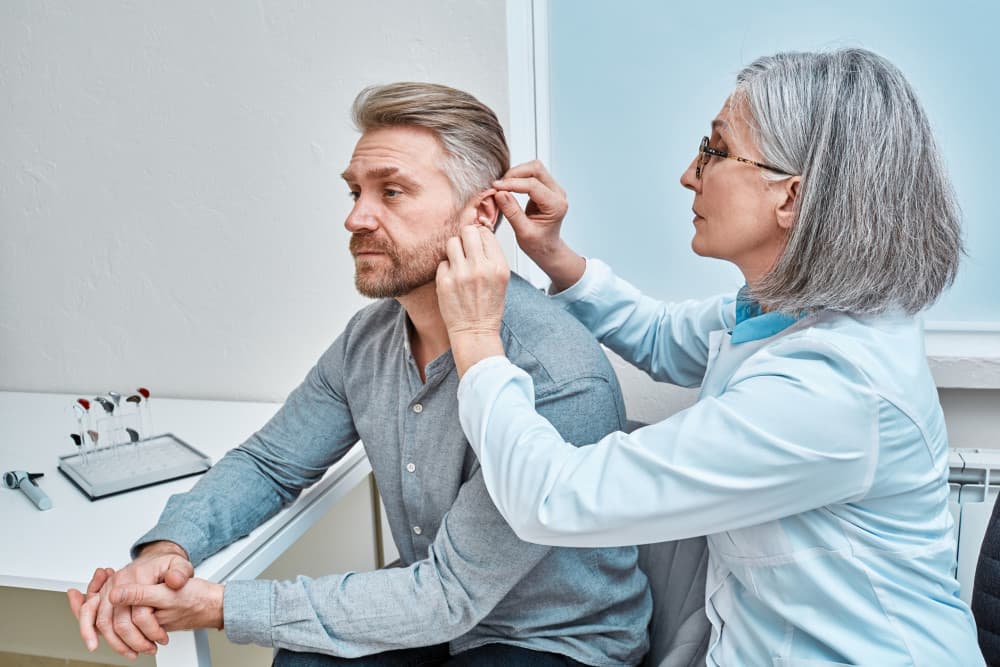Does Insurance Cover Hearing Aids?

8 Minutes

Team Curative

Jun 20, 2024
Many Americans experience hearing loss in their lifetime, particularly as they age. Hearing aids are the standard solution to this problem, and many options exist on the market. Effective preventive care includes regular hearing screenings and guidance from a medical provider about dealing with hearing loss. However, insurance coverage of hearing aids can be complex, leaving many struggling with the high costs.
If you or a loved one is having trouble obtaining hearing aids, read on to discover strategies for making these essential devices more accessible and affordable.

Hearing loss is widespread in the United States
Did you know that the number of Americans experiencing hearing loss is expected to nearly double by 2060?
Hearing loss affects people of all ages, including 60.7 million Americans age 12 and older.
About 2 to 3 out of every 1,000 children in the United States are born with a detectable level of hearing loss in one or both ears.
About 15.5% of adults age 20 and older have hearing loss.
31.1% of people age 65 and older experience hearing loss.
40.3% of people age 75 and older experience hearing loss.
Men are almost twice as likely as women to have hearing loss among adults ages 20-69.
Hearing loss is often left untreated
If hearing loss is not treated, it is associated with a variety of other issues:
difficulty communicating
feelings of social isolation
loneliness and depression
increased risk of dementia
The good news: when hearing loss is addressed appropriately, people communicate better and have a lower risk of falls, dementia, and hospitalization.
Studies show that approximately 28.8 million American adults could significantly benefit from wearing a hearing aid. But for a number of reasons, many don’t currently use one. Only 16% of people aged 20-69 with hearing loss have ever used a hearing aid, while just 30% of those over 70 who could benefit from wearing hearing aids have done so.
The biggest reason people who need them don’t get it is that hearing aids are expensive. The cost discourages many people from pursuing them as a solution to hearing loss. According to survey data, 35% of respondents said they don’t wear hearing aids due to cost, which often runs in the range of $4,000 up to $8,000 for a more advanced pair. This price tag is prohibitive for many Americans, who often juggle various health expenses.
As a result, “hearing loss is severely undertreated,” says Jessica Galatioto, director of audiology at Columbia University Medical Center in New York City. Because costs are high, private insurance plans don’t typically cover hearing aids, and many people who could benefit from hearing aids never purchase them.

Why are hearing aids so expensive?
Typically, audiologists buy hearing aids from manufacturers at wholesale prices and then set their prices. The retail price of hearing aids can vary widely, depending on the type and the retailer.
Most audiologists include related services with the cost of the hearing aids themselves. The sticker price typically consists of the professional audiology services required to fit and program your hearing aids, as well as repair and maintenance for a specified period. Sometimes, diagnostic testing is included in the bundled price. While some hearing aid retailers are beginning to offer “unbundled” services that bring costs down, the pricier suite of services is more common.
Several other factors contribute to the high cost of hearing aids:
constant research and development for product and technology innovation
high markups by hearing aid manufacturers
limited insurance coverage options
In recent years, over-the-counter hearing aids have become more widely available. They are less expensive than prescription hearing aids, with a general price range of $299–$2,500 per pair. While these costs are still high, they make it possible for more Americans to treat their hearing loss with hearing aids.
Are hearing aids covered by insurance?
Unfortunately, the answer to this question is very often no. Despite the proven benefits of hearing aids, they are not covered by most health insurance plans. Some private insurance plans include limited coverage for hearing exams and hearing aids, and some plans offer these services as a separate benefit, similar to vision or dental coverage.
The bottom line: for many Americans, purchasing hearing aids means high out-of-pocket costs.
Curative covers hearing aids
Curative plans cover hearing aids. You and your provider will create a plan for hearing loss treatment. If this includes hearing aids, your Care Navigator can help you understand the options available and assist you in securing coverage.
Curative covers the following:
therapy for hearing loss or impairment
routine hearing loss care
care for medical conditions or accidents related to hearing
prescription and over-the-counter hearing aids
free maintenance, including cleanings, follow-up visits, and adjustments
Get Costco hearing aids for $0
Curative provides access to members who consider Costco hearing aids. After completing the Baseline Visit, members unlock $0 hearing aids. It’s easier than going through your doctor because a prior authorization is not required.
Costco Hearing Aid Perks:
Quality warranty: Rest assured that your Costco hearing aids have a 3-year warranty with 2 years of loss & damage coverage.
Free cleanings and follow-up visits: You’ll get complimentary cleanings. Additionally, free follow-up appointments and adjustments are available.
Wide range of options: Choose hearing aids that suit your needs and preferences.
Costco membership covered: If you currently don't have a Costco membership, we'll provide you with a free basic-level Costco membership for one year.
How it works:
If you don’t already have a Costco membership card, call Member Services at 855-428-7284 for assistance.
Pick up your Costco card from the membership counter and checkout using your handy Curative Cash Card – For more information on the Curative Cash Card and to make sure it’s activated, visit our Curative Cash Card page.
Schedule a complimentary hearing evaluation at your nearest Costco.
After your evaluation, you’ll be able to select the hearing aids that work best for you.
Once you’re ready to checkout, give member services a call for approval, then your Curative Cash Card will be unlocked for use.
Come back for cleanings and follow-up visits as needed, and enjoy your new hearing aids (and Costco membership for one year!) To find additional in-network hearing aid providers, visit our provider search page. Questions? Reach out to Member Services at 855-428-7284
Curative: Simple, accessible health insurance
Curative is a new kind of employer-sponsored health insurance centered around affordability, engagement, and simplicity. With Curative’s approach to preventive care, you and your family can focus on ensuring you receive the best possible care without compromising due to cost. With Curative coverage, there are no co-pays or deductibles, and you and your loved ones receive personalized care. Curative takes the mystery out of insurance coverage.
The Curative Baseline Visit
Curative customers complete a confidential, 100% free Baseline Visit in the first 120 days from the start of their Curative plan. During the visit:
You’ll meet with your provider from the comfort of your home.
You’ll meet your Care Navigator, who explains your benefits and connects you with available resources.
You’ll have unrushed time with a clinician to discuss your health history and goals.
Your provider will perform diagnostic screenings, including a hearing screening.
The Baseline Visit is designed to make accessing healthcare simple. Curative members get their questions answered and begin a journey toward good health with the support of preventive care providers and their Care Navigator.
The Curative Care Navigator
Every Curative member is assigned a Care Navigator. This expert is your professional guide to your insurance coverage and preventive care journey. Care Navigators ensure you make the most of your Curative health plan and receive the care you need.
After your first meeting with your Care Navigator, you’ll know where the nearest urgent care, emergency room, and available primary care providers are. Care Navigators provide support for your healthcare journey:
They connect you with the right doctor when needed.
They help you build preventive care strategies.
They guide you through paperwork, including pharmacy transfers.
They provide trustworthy, continuous support.
They are available by phone, text, and email to answer your coverage questions.
Curative Care Navigators are focused on providing the best member care possible. Anytime you need something non-urgent, your Care Navigator is there to help and follow up on your requests. Curative Care Navigators aren’t your typical member service representative; they’re your partner in health.
Curative: Simple preventive care for hearing loss
Curative knows that caring for your hearing is an integral part of your healthcare journey. Therefore, finding high-quality care and adequate hearing aid coverage is a priority under Curative plans. Curative members can experience the proven benefits of hearing aids with zero out-of-pocket expenses.
Thanks to the personalized assistance of their Care Navigator, members avoid the headache of navigating complex rules and exceptions around hearing loss healthcare benefits. Curative makes getting, maintaining, and paying for hearing aids simple and affordable. With Curative, the focus is on healthcare, not cost.
About Curative
Curative wants people to love using their health benefits. Our health plan delivers better health through affordability, engagement, and simplicity. No copays. No deductibles. No...really. Curative is changing the way we view health insurance.
References
Gatta, Frances (Sept 2023). Are Hearing Aids Covered by Insurance in 2024? Forbes Health.https://www.forbes.com/health/hearing-aids/hearing-aids-insurance-coverage/
National Council on Aging. (Nov 2023). Hearing Loss Statistics 2024: More Common Than You Might Think. Adviser. https://www.ncoa.org/adviser/hearing-aids/hearing-loss-statistics/
National Institute of Deafness and Other Communication Disorders. (Mar 2024). Quick Statistics About Hearing, Balance, & Dizziness. https://www.nidcd.nih.gov/health/statistics/quick-statistics-hearing#:~:text=About%2028.8%20million%20U.S.%20adults%20could%20benefit%20from%20using%20hearing%20aids.&text=Among%20adults%20ages%2070%20and,aids%20have%20ever%20used%20them
U.S. Food and Drug Administration (Nov 2022). Hearing Aid Benefits and Limitations. https://www.fda.gov/medical-devices/hearing-aids/hearing-aid-benefits-and-limitations
Sign up for our Newsletter
Table of Contents
Hearing loss is widespread in the United States
Hearing loss is often left untreated
Why are hearing aids so expensive?
Are hearing aids covered by insurance?
Curative covers hearing aids
Curative: Simple, accessible health insurance
Curative: Simple preventive care for hearing loss








